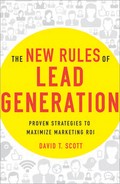A Paradigm Shift
We live in an interesting time for lead-generation marketing. It is (and always will be) a sales support function. Its traditional goal in corporate marketing is to provide warm, actionable leads to the company’s sales force, enabling salespeople to close more deals and generate more revenue. A sales force used to be an essential requirement for any business, and lead-generation marketing provided support for the sales. Previously, only a few specialty companies, such as L.L.Bean, were able to get by without a sales force, relying exclusively on print catalogs to drive sales.
But the role of lead-generation marketing is evolving, as more companies adopt e-commerce and mobile technologies as sales vehicles. With the evolution of online catalog marketing and self-service sales, some e-commerce companies don’t even need a sales force. They just need highly effective lead-generation marketing.
This is one of the most exciting transformations that has occurred in the world of business over the last decade. With the development of e-commerce, some organizations have been able to take the sales force entirely out of the equation. This development puts greater influence on the marketing discipline, to the point where, in some organizations, lead-generation marketing could effectively serve as both sales and marketing for the company. It’s a very powerful paradigm shift.
This shift first played out in the travel industry. Companies like Expedia introduced self-service travel concepts that essentially put travel agencies out of business. You no longer have to hire a travel agent to purchase an airline ticket or to book hotel or rental car reservations. Now you can make your own reservations online.
This paradigm shift is extending to the real estate field. Companies like Redfin and Zillow now provide real estate search engines and databases that allow Web users to offer or search for homes for sale online. As a home buyer, you can check the location, property values, and other information about the house, get a home price estimate, compare mortgage options with different lenders, and ask advice from a community of real estate experts. As a home seller, you can offer your home for sale and post information about it. You may not even need a real estate agent to buy or sell a home.
The car buyer’s market is also being affected by this paradigm shift. Auto industry marketers are now providing car buyers with information that was formerly provided by salespeople in the dealer’s showroom. These days, 80% of the car-buying experience is done online. People research car models, read consumer reports and reviews, check out the 360°-view on the car maker’s website, download a list of the car’s features, and get an estimate of the price. When the buyer walks into the dealership, marketing has already done most of the work for the sales force. You may never be able to buy a car without a salesperson to sell it to you, but it’s a definite power shift.
What’s driving this shift in business practices that gives lead-generation marketing more influence and importance in e-commerce businesses? Consumers want more control over the buying experience. They want to do their own research on products and understand their options before making a purchase. The Internet provides a means for consumers to find product information quickly and easily and, in many cases, to make purchases more conveniently.
As companies seek to fulfill the consumer’s need for more buying information and control, they are relying more on lead-generation marketing. This reflects a dramatic shift in the importance of marketing in relation to sales.
To further understand this shift, let’s look at where lead-generation marketing falls in the world of marketing, and how it relates to its “brother”—brand awareness marketing.
